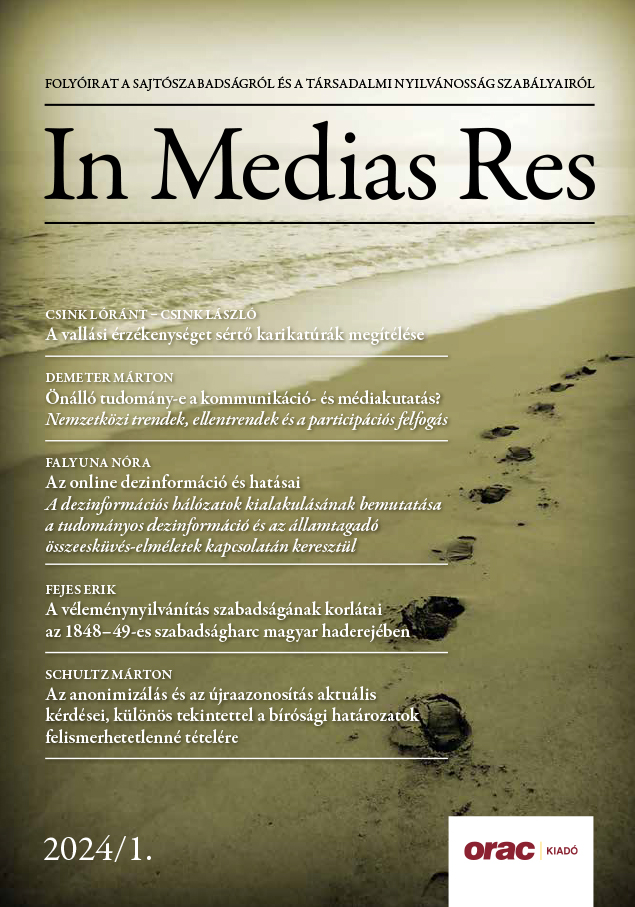Önálló tudomány-e a kommunikáció- és médiakutatás?
Nemzetközi trendek, ellentrendek és a participációs felfogás
DOI:
https://doi.org/10.59851/imr.13.1.2Kulcsszavak:
participáció, hálózatkutatás, egészségkommunikáció, big data, digitális újságírásAbsztrakt
A kommunikáció- és médiatudományok diszciplináris helyzete máig bizonytalan. A nemzetközi irodalomban szokásos erre a tudományterületre sokszínű, ám egységes identitással nem rendelkező entitásként tekinteni, és sokak szerint ilyen identitás kifejlesztésére nincs is szükség. Ez a tanulmány azt vizsgálja, hogy a kommunikáció participációs elmélete képes-e arra, hogy egymástól valóban nagyon különböző kommunikációkutatási hagyományokat egységes keretben tárgyaljon. A dolgozat ennek tesztelésére az egészségkommunikáció, a digitális újságírás, a hálózattudomány és a big data fogalmi kereteit elemzi a participációs elmélet rendszerében.
Hivatkozások
Ang, Peng H. et al.: Intellectual Balkanization or Globalization: The Future of Communication Research Publishing. 96(4) Journalism & Mass Communication Quarterly (2019) 963–979., https://doi.org/10.1177/1077699019878461
Atkin, Charles – Silk, Kami: Health Communication. In Stacks, Don W. – Salwen, Michael B. (szerk.): An Integrated Approach to Communication Theory and Research. Communication Theory and Methodology. London, Routledge, 2009 (2. kiadás), 489–503.
Caitlin: A Quantitative Turn in Journalism? Chartbeat, 2013. október 31., https://bit.ly/4duufck.
Couldry, Nick – Powell, Alison: Big Data from the Bottom Up. 1(2) Big Data & Society (2014), https://doi.org/10.1177/2053951714539277
Demeter, Márton: On Analysis and Its Role in Communication Theories. 1(1) KOME – An International Journal of Pure Communication Inquiry (2012) 31–45., https://doi.org/10.17646/KOME.2012.14
Demeter, Márton: Changing Center and Stagnant Periphery in Communication and Media Studies. 12 International Journal of Communication (2018) 2893–2921.
Demeter, Márton: Power Relations in Global Knowledge Production: A Cultural/Critical Approach. 15(1) Journal of Multicultural Discourses (2019) 1–17., https://doi.org/10.1080/17447143.2019.1657124
Entradas, Marta: In Science We Trust: The Effects of Information Sources on COVID-19 Risk Perceptions. 37(14) Health Communication (2022) 1715–1723. https://doi.org/10.1080/10410236.2021.1914915
Freelon, Deen: Co-Citation Map of 9 Comm Journals, 2003–2013, https://bit.ly/4a9kZYi.
Gulyás, Adrienn: Traduire Rabelais. 25(1) Hungarian Studies: A Journal of the International Association for Hungarian Studies and Balassi Institute (2011) 37–44., https://doi.org/10.1556/HStud.25.2011.1.3
Gulyás, Adrienn: How Do New Languages Arise? A Comparison of Romanization and Gallicization. Acta Antiqua Academiae Scientiarum Hungaricae, 2019/1–4., 9–18., https://doi.org/10.1556/068.2019.59.1-4.3
Gulyás Adrienn: PETRA-E deszkriptorok a műfordításoktatásban. In Csikai Zsuzsa (szerk.): Iránytű az egyetemi fordítóképzéshez. A műfordítás-oktatás kérdései. Pécs, Kontraszt Plusz, 2021, 39–49.
Horányi Özséb: A kommunikáció mint participáció. Budapest, Typotex, 2006.
Lash, Scott: Power after Hegemony: Cultural studies in Mutation. 24(3) Theory, Culture & Society (2007) 55–78., https://doi.org/10.1177/0263276407075956
David Beer: Power Through the Algorithm? Participatory Web Cultures and the Technological Unconscious. 11(6) New Media & Society (2009) 985–1002., https://doi.org/10.1177/1461444809336551
Lee, Jiyoung – Kim, Yungwook – Kelsey, John P.: Beyond Wishful Thinking During the COVID-19 Pandemic: How Hope Reduces the Effects of Death Arousal on Hostility Toward Outgroups among Conservative and Liberal Media Users for COVID-19 Information. 37(14) Health Communication (2022) 1832–1841., https://doi.org/10.1080/10410236.2021.1921906
Molina, José L. et al.: The Embeddedness of Social Capital in Personal Networks. 8(2) Network Science (2020) 189–203., https://doi.org/10.1017/nws.2019.30
Thurman, Neil: Computational Journalism. In Wahl-Jorgensen, Karin – Hanitzsch, Thomas (szerk.): The Handbook of Journalism Studies. New York, Routledge, 2019 (2. kiadás), 213–229.
Volker, Beate: Social Capital Across the Life Course: Accumulation, Diminution, or Segregation? 8(3) Network Science (2020) 313–332., https://doi.org/10.1017/nws.2020.26
Waisbord, Silvio: Communication: A Post-Discipline. London, Polity, 2019.
Wiley, Sarah K.: The Grey Area: How Regulations Impact Autonomy in Computational Journalism. 11(6) Digital Journalism (2021) 889–905., https://doi.org/10.1080/21670811.2021.1893199
Zelizer, Barbie: Journalism in the Service of Communication. 61(1) Journal of Communication (2011) 1–21., https://doi.org/10.1111/j.1460-2466.2010.01524.x
Megjelent
Hogyan kell idézni
Folyóirat szám
Rovat
License
Copyright (c) 2024 Demeter Márton

This work is licensed under a Creative Commons Attribution 4.0 International License.


